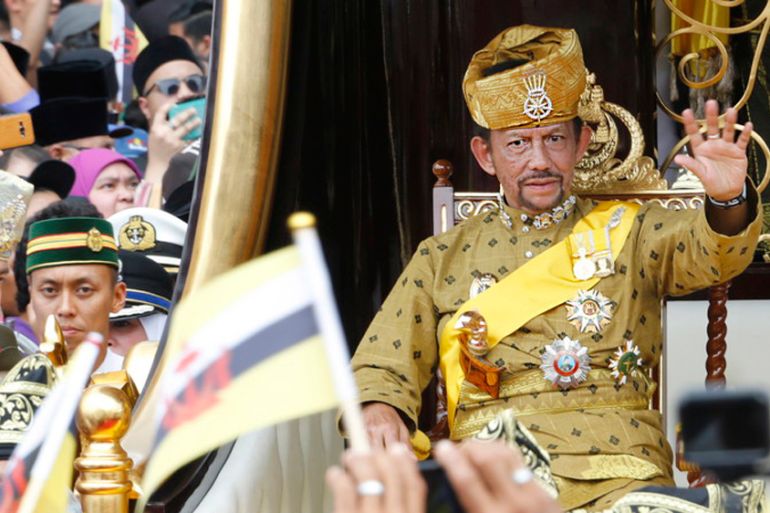Brunei enacts new penal code as sultan calls for ‘stronger’ Islam
New penal code imposes death penalty for rape, adultery, sodomy, robbery and introduces public flogging.

Brunei is enacting a strict new penal code that imposes death by stoning for adultery and gay sex, as well as amputations as punishment for theft, despite widespread criticism.
An absolute monarchy, ruled for 51 years by Sultan Hassanal Bolkiah, oil-rich Brunei first announced the new penal code in 2013, but full implementation has been delayed.
Keep reading
list of 4 itemsPalestinian Prisoner’s Day: How many are still in Israeli detention?
‘Mama we’re dying’: Only able to hear her kids in Gaza in their final days
Europe pledges to boost aid to Sudan on unwelcome war anniversary
Bolkiah, 72, is the world’s second-longest reigning monarch and ranks as one of the world’s wealthiest people.
The new law mostly applies to Muslims, though some aspects will also apply to non-Muslims. It stipulates the death penalty for a number of offences, including rape, adultery, sodomy, robbery and insulting or defaming the Prophet Muhammad.
It also introduces public flogging as punishment for abortion as well as amputation for theft and criminalises exposing Muslim children to the beliefs and practices of any religion other than Islam.
The sultan first announced plans for the code in 2013.
The small Muslim-majority country, sandwiched between two Malaysian states on the island of Borneo, had introduced penalties in stages, all of which come into force on Wednesday.
The laws will make Brunei the first country in East or Southeast Asia to impose the new penal code at the national level, joining several mostly Middle Eastern countries, such as Saudi Arabia.
‘Barbaric to the core’
The decision to push ahead with the implementation of the laws come after a long line of politicians, rights groups and celebrities, including actor George Clooney and musician Elton John, condemned the new laws.
Clooney and John are among those calling for a boycott of hotels owned by the sultanate, which include the Beverly Hills Hotel, the Dorchester in London and the Plaza Athenee in Paris.
Phil Robertson, deputy Asia director for the Human Rights Watch, said the code was “barbaric to the core, imposing archaic punishments for acts that shouldn’t even be crimes”.
Robertson also said there was “no place in the 21st century” for this kind of penal code.
Comprehensive @hrw release on #Brunei's new penal code, and horrific, medieval punishments for vulnerable women, children, #LGBT & others. No place in the 21st century for this kind of law! https://t.co/x0IMB9YQ8u pic.twitter.com/XsOprlXRYr
— Phil Robertson (@Reaproy) April 3, 2019
Governments have also weighed in with the United States saying the punishments run counter to Brunei’s “international human rights obligations”.
“The United States strongly opposes violence, criminalisation and discrimination targeting vulnerable groups,” said deputy State Department Spokesman Roberto Palladino.
France and Australia also called on Brunei to renounce the measures, with both governments expressing concern.
On Wednesday, UN Secretary-General Antonio Guterres criticised the move.
Guterres “believes that human rights are to be upheld in relations to every person everywhere without any kind of discrimination,” said UN spokesman Stephane Dujarric. “The legislation approved is in clear violation with the principles expressed.”
The UN chief “stands clearly against any form of cruel punishment”, said Dujarric.
“He stands very much for the protection of rights of all people to be able to be with who they want to be and love who they want to love.”
#Brunei
We are very concerned by the entry in force of a new criminal code on April 3, which provides for corporal punishment and the death penalty for crimes including homosexuality, apostasy, blasphemy, and adultery.https://t.co/jO87CJj4ER pic.twitter.com/yuS2vc040Y— France Diplomacy🇫🇷 (@francediplo_EN) April 2, 2019
Australia has raised our concerns with the Brunei government on the introduction of the full Syariah Penal Code today. We absolutely oppose the death penalty & are committed to the rights of LGBTI people. We will continue to advocate for human rights in the region & beyond. @dfat
— Marise Payne (@MarisePayne) April 3, 2019
In a public address to mark a special date in the Islamic calendar, the sultan called for stronger Islamic teachings but did not mention the new penal code.
“I want to see Islamic teachings in this country grow stronger,” he said in the nationally televised speech at a convention centre near the capital Bandar Seri Begawan.
“I would like to emphasize that the country of Brunei is a … country that always devotes its worship to Allah.”
He said that he wanted the Muslim call to prayer to ring out in all public places, not just in mosques, to remind people of their Islamic duties.
The sultan, who has been on the throne for over five decades, also insisted that Brunei was a “fair and happy” country.
“Anyone who comes to visit this country will have a sweet experience, and enjoy the safe and harmonious environment,” he said.